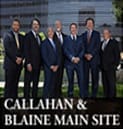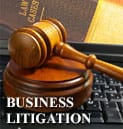Precedent Setting Cases
- Callahan & Blaine Wins $934 Million for Beckman Coulter
- Callahan & Blaine Obtains Defense Verdict: Jury Clears Widow of Any Wrongdoing in $114 Million Ponzi Scheme
- Callahan & Blaine obtains record-setting $50 million settlement for two Orange County joggers
- Orange County Register Will Deliver $38 Million to Carriers
- Huntington Beach Man Settles Suit Against Trucking Company for $28 Million
- Refusing to Quit, Callahan & Blaine Delivers a $30 Million Settlement in Complex D&O Case
- Callahan & Blaine Recovers $15.5 Million for California Bicyclist
Business
Insurance
- Insurer’s Attempt to Avoid Jurisdiction Thwarted
- Callahan & Blaine Defends Claims of Preferential Payments
- Successful Procurement of Insurance from Northridge Earthquakes
- Successful Defense of Insurance Broker
- Callahan & Blaine Wins Major Appellate Victory in Insurance Bad Faith Case
Insurance Accounting
Unfair Competition
- Client Wins $5 Million for Destruction of Insurance Agency
-
Callahan & Blaine Obtains Both Insurance Coverage and Complete Defense for Radio Station
Reported Decisions
J.K. Harris & Co., LLC v Kassel, 253 F. Supp. 2d 1120 (N.D. Cal. 2003)
Apple Computer, Inc. v. Podfitness, Inc., 2007 U.S. Dist. LEXIS 36347(N.D. Cal. May 9, 2007)
ProLink Holdings Corp. v. Fed. Ins. Co., 2011 U.S. Dist. LEXIS 119222 (N.D. Ill. Oct. 14, 2011)
Sunham Home Fashions, LLC v. Diamond State Ins. Co., 813 F. Supp. 2d 411 (S.D.N.Y. 2011)
Monster Energy Co. v. HRHH Hotel/Casino, LLC, 2014 U.S. Dist. LEXIS 11965 (C.D. Cal. Jan. 27, 2014)
Falcon Stainless, Inc. v. Rino Cos., 572 Fed. Appx. 483 (9th Cir. Cal. 2014)
Lang Van v. VNG Corp., 2014 U.S. Dist. LEXIS 155289 (C.D. Cal. Oct. 8, 2014)
Sentex Systems v. Hartford Accident & Indemnity, In a precedent-setting case with nationwide implications for the insurance industry and business groups alike, the Ninth Circuit Court of Appeals ruled that commercial liability insurance policies provide insurance coverage for claims of trade secret misappropriation. In Sentex Systems Inc. v. Hartford Accident & Indemnity Co., the Ninth Circuit Court of Appeals ruled that "advertising injury" provisions of Commercial General Liability insurance policies provide coverage for a broad sphere of allegations of trade secret misappropriation. The insurance industry had taken the narrow position that "advertising injury" provisions of commercial insurance policies provided coverage only for allegations of misappropriation of actual "advertising text."
The Ninth Circuit affirmed the, opinion of U.S. District Judge Richard A. Paez. Sentex Systems, Inc. v. Hartford Accident & Indemnity. In the District Court opinion, Judge Paez ordered Hartford to pay Sentex's defense costs and damages in a trade secret misappropriation lawsuit. Plaintiff Sentex Systems designs and manufactures access control systems for commercial and residential buildings and gated complexes. The East-coast firm of Electronic Security Services, Inc. sued Sentex, claiming a former sales manager joined Sentex and used confidential, trade secret information to recruit its customers. Sentex requested its insurance company, Hartford Accident & Indemnity Co., to pay for its defense in the lawsuit, based upon advertising and personal injury coverage in the policy. Hartford refused, until ordered by the Ninth Circuit, to pay.
Surgin Surgical Instrumentation Inc. v. Farmers Group Inc. In Surgin Surgical Instrumentation Inc. v. Farmers Group Inc., Truck Insurance, a subsidiary of The Farmers Group, deliberately broke a contract to defend Surgin in a series of patent infringement and unfair competition lawsuits. After successful litigation by Callahan & Blaine's senior partner, Daniel J. Callahan, an Orange County Superior Court Judge awarded $60 million to a surgical manufacturing company against one of the state's largest insurance companies.
Surgin manufactured certain devices for cataract surgery and had about ten percent of the market with projected profits of seven million dollars yearly. Alcon, a competitor, filed several suits against Surgin. Truck refused to defend all but one of the suits; it agreed to defend one which had already been dismissed. After incurring $270,000 in attorney fees, Surgin could no longer afford to litigate the case, was forced to settle and agree it would no longer make the devices, resulting in lost profits. This settlement gave Alcon a monopoly and allowed it to charge the public an additional $140 million in increased health care costs. In the course of Surgin's suit against its insurance carrier, Callahan discovered that Truck Insurance, a subsidiary of Farmers Insurance Group, had engaged in systematic destruction of documents requested in discovery as testified by Michael D. Conn, a former Vice President of Farmers Group, Inc. in charge of Farmers Investigation Department. Conn stated that Farmers closed all 18 investigation units nationwide, sent all the investigators home, and shredded the documents relevant to pending proceedings, including Surgin's case. After Judge C. Robert Jameson awarded Surgin $57 million plus costs and $527,000 in attorneys fees, he instructed Mr. Callahan to notify California Insurance Commissioner John Garamendi of the outcome of the case. This notification prompted Garamendi and Assembly Judiciary Committee Chairman Phil Isenberg, D-Sacramento, to propose legislation to ban all companies, insurance carriers included, from passing on the costs of punitive damages awards to stock holders and policy owners. Legislation was also proposed to require court rulings in bad-faith matters to be reported to the Department of Insurance. Mr. Garamendi commenced an investigation into Farmers handling of claims.
Scottsdale Ins. Co. v. Superior Court, Fonovisa v. Cherry Auction, et al., In another nationwide precedent-setting case, Fonovisa v. Cherry Auction, swap meet owners were found liable for vicarious and contributory copyright and trademark infringement when counterfeit merchandise is sold by independent vendors at swap meets. The Ninth Circuit determined that swap meet owners sufficiently control their premises enough to know if copyright and trademark violations are occurring, and they have an indirect financial stake in sales of illegal products. The court recognized that this case was the first to reach a federal appeallate court regarding vicarious liability for trademark and copyright infringement.
Fonovisa owns copyrights and trademarks for Latin music recordings and owns the Fonovisa record label. Fonovisa had sued Cherry Auction in 1993, but lost in the Federal District Court. The Ninth Circuit reversed this lower court ruling and held Cherry Auction liable for Fonovisa's damages.
Hall v. Aqua Queen, The Federal Circuit Court of Appeals in Washington D.C. has affirmed the dismissal of seven patent infringement cases brought by "the father of the waterbed" against members of the waterbed industry that he believed were infringing his waterbed patent. Hall v. Aqua Queen. Beginning in 1991, Charlie Hall -- who had received a waterbed patent in 1971 -- began suing manufacturers of waterbeds for possible patent infringement. The lawsuits were initiated in the United States District Court for the Central District of California before the Honorable James M. Ideman. Last year, the Court was presented motions from eight of the manufacturers who believed that Hall had waited too long -- upwards of twenty years -- before bringing his suits against the manufacturers. Judge Ideman ruled that Hall's lengthy delay in bringing the suits justified the manufacturer's claim that the suits should be barred under the legal doctrines of laches and estoppel, and he dismissed the cases. Judge Ideman's ruling was appealed by Mr. Hall, the Federal Circuit Court of Appeals issued an opinion in which the rulings by Judge Ideman were affirmed for seven of the eight manufacturers.
Hall v. Easy Rest, Inc., Callahan & Blaine successfully represented manufacturers before Judge Ideman in the Federal Circuit Court of Appeals, Hall v. Easy Rest, Inc. In rendering its opinion, the Federal Circuit focused its attention on one of Callahan & Blaine's clients, Atlanta Vinyl, as providing a prime example of an entity who was justifiably correct to assert that Hall waited too long to sue. The opinions are pending publication.
Kurisu v. Michigan Millers Mutual Insurance Co., In another trademark and unfair trade practices case, Kurisu v. Michigan Millers Mutual Ins. Co., the California Court of Appeal ruled that an insurer must defend its insured on an unfair competition claim seeking damages for wrongful appropriation of proprietary information. The court found that the insurance policy's "unfair competition" coverage included coverage for injuries that occurred in the course of advertising activities. Callahan's client, Vern Kurisu, formed Mask Technology, Inc. which used a secret formula to coat computer circuit boards with protective solder. The successful company became a family affair, and inevitably disputes arose, forcing Mr. Kurisu out. Mr. Kurisu submitted the company's claims against him to his insurance carrier, who refused to defend him. Callahan successfully forced the company to pay for his defense of the lawsuit.
TKB International v. United States of America, The Internal Revenue Service sued one of Callahan's clients, TKB International, Inc., who successfully defended an action to recover tax liens. In TKB International, Inc. v. United States of America, the Ninth Circuit held that these tax liens were not valid against TKB, who purchased land subject to the liens in a foreclosure sale, when TKB did not have notice of the liens because they fell outside the chain of title.










